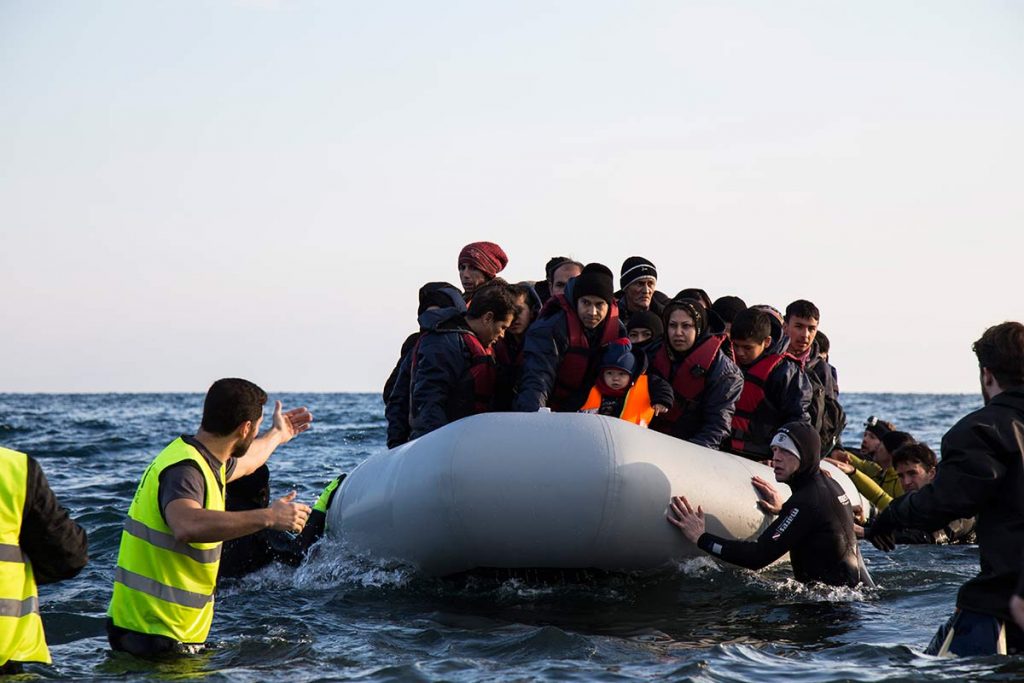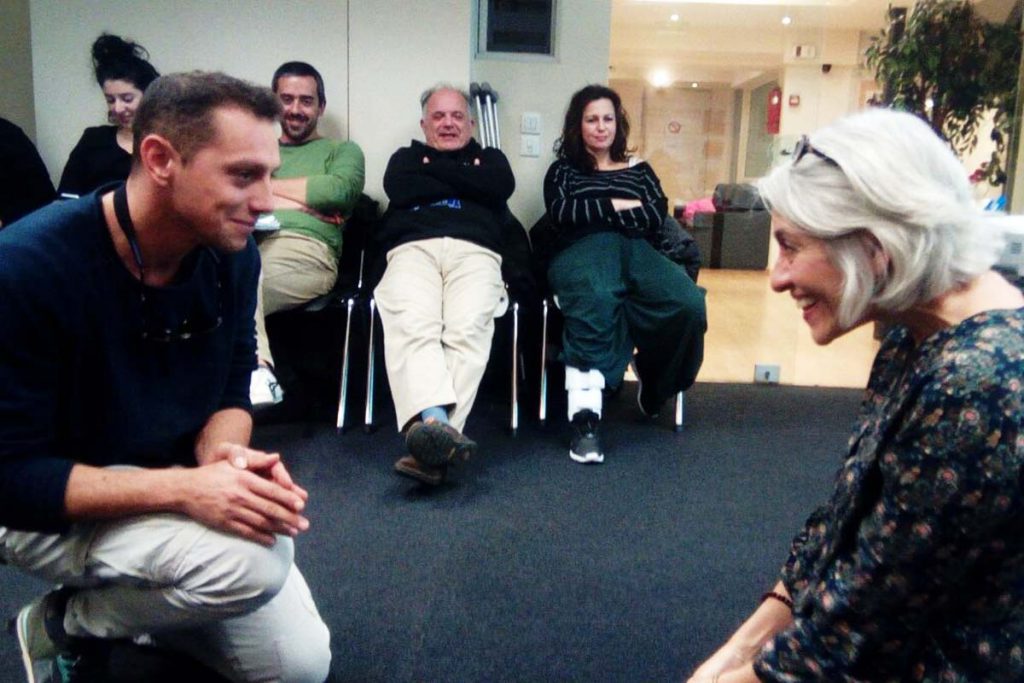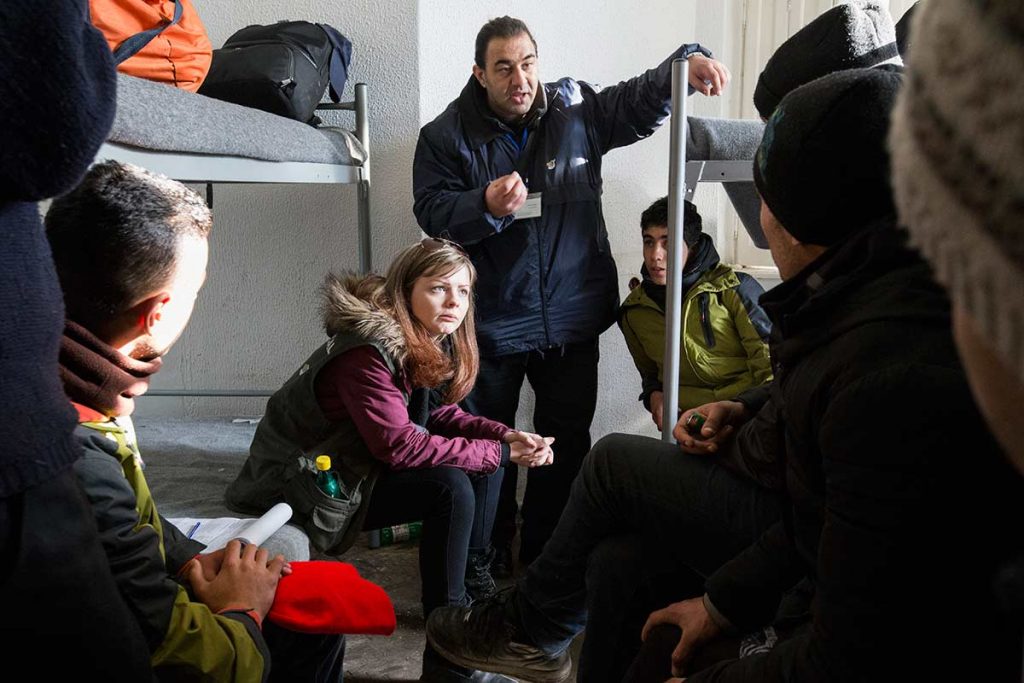A press conference held recently in Athens to present the first Greek language translation of the World Health Organization’s Psychological First Aid Guidelines underscores the importance of first responders’ ability to provide support for acute emotional issues as they receive refugees who have endured long, harrowing journeys to escape war at home and reach Europe.

The event, held December 16th, was organized by International Medical Corps’ Country Team in Greece and a local organization, Day Center Babel, which provides mental health services to refugees and migrants.
Main speakers included Dr. Leslie Snider, head of the editorial team which developed the Psychosocial First Aid Guidelines as well as Dr. Dimitris Ploumbidis Chairman of the Greek Psychiatric Association and Effie Latsoudi, member of the volunteer group in PIKPA, Lesvos, which was awarded the UNHCR’s Nansen Award for 2016.
Psychological First Aid (PFA) constitutes an important attempt to more widely address the direct psychosocial consequences of humanitarian crises and natural disasters. Indicative of its importance, 2016’s World Mental Health Day, October 10th, was dedicated to PFA.
In 2015, more than one million refugees arrived in Greece, the majority of them crossing the Mediterranean in makeshift rafts and boats to flee armed conflict in the Middle East. The influx made the country a focal point of Europe’s worst refugee crisis since World War II. While the refugee flow into Greece dropped significantly in 2016 to just over 175,000, the publication of the PFA guidelines in Greek will serve as a valuable tool for first responders in the country as they continue to assist arriving migrants during their first hours and days ashore as well as during subsequent months of waiting and uncertainty.

During the press conference, Dr. Snider, who has 20 years of experience in supporting those affected by natural disasters and other emergencies, noted that, “It is very important to use a simple language in the guides so it can be understood by all who read them. This particular guide helps people become more conscious of the way they already do their work while also addressing the need to care for those who take care of others.”
Dr. Ploumbidis, a professor of Psychiatry, stressed the usefulness of the guide. Recalling his own experience when supervising psychiatrists and psychologists at the Chios hospital, he said: “What we have said to people is that initially there is a need for “psycho-iodine” and “psycho-patches’. This was better understood after the seminar we received on PFA.”
Ms.Latsoudis spoke about her own experience of PFA training and how it had enriched her work in the field. She said she found it especially relevant for staff suffering from mental exhaustion as they assisted refugees arriving in the islands.

Nikos Gionakis, the Scientific Coordinator of Day Center Babel described his organization’s experience with professionals and volunteers wanting to help but didn’t have the proper “tools” that could support them in their work. He said PFA covers this gap and enables the “frontline professionals” to feel the security needed to meet the challenges of providing humanitarian assistance in a supportive way.
Although the overall numbers of refugees have dropped in 2016, the need for PFA has continued to be high in Greece, with over 62,000 refugees, asylum seekers and migrants currently in Greece, who remain in camps and makeshift housing throughout the country. This population continues to face uncertainty, stressors and hardships during the winter and humanitarian staff remains under pressure with major workloads and the need to respond supportively to refugees while also remembering their own staff self-care.
To address these needs, International Medical Corps has provided mental health services in camps where gaps existed and also organized four PFA training courses and three referrals in Athens. Two additional PFA training courses were provided in Thessaloniki, that included participants from more than 15 local and international organizations and NGOs. International Medical Corps also invited Dr. Leslie Snider to conduct a training of trainers course for those who will themselves become trainers. Working together, International Medical Corps and Day Center Babel have trained a total of 70 workers and volunteers.

Five things to remember about Psychological First Aid:
1. PFA is a humane, supportive response for people in distress who may need and want support, in ways that respect their dignity, culture and capacities and includes the steps of:
2. Looking: Check for safety and identifying people with obvious urgent basic needs and those with serious distress reactions.
3. Listening: Comfort people in distress and assess their needs and concerns.
4. Linking: Help people meet their basic needs, linking people to information and services.
5. PFA providers also need to recognize the importance of self-care when preparing to help, as well as after providing support.